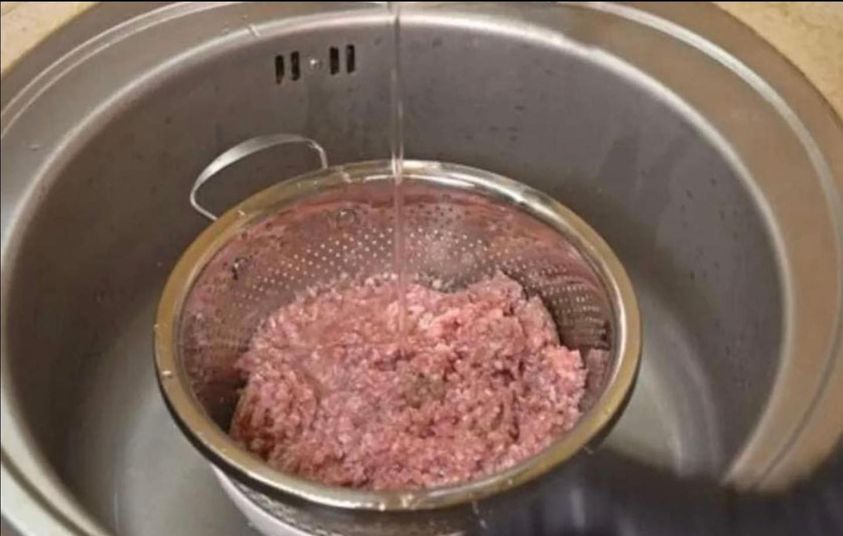When it comes to cooking, few topics stir up more debate than kitchen hygiene and food prep methods. Everyone seems to have their own approach to handling ingredients, and once people find a method they trust, they tend to stick with it. But that doesn’t mean there’s only one right way to do things. Different culinary techniques exist for a reason, and while you may swear by your own routine, it’s worth considering other perspectives. One hot-button issue that continues to divide home cooks and professionals alike is the question: should you rinse ground beef before cooking it? Some argue that it’s essential, while others firmly say no. So what’s the truth? Let’s take a closer look at the arguments on both sides, along with what the experts—and especially the USDA—have to say about it.

Those in favor of rinsing ground beef often cite health reasons as their main motivation. Some home cooks believe that by rinsing the meat under cold water, they’re washing away extra fat, making the final dish leaner and healthier. This can sound appealing, especially for anyone trying to reduce their intake of saturated fats or calories. To these cooks, that quick rinse feels like a simple step toward a more health-conscious meal, without having to buy leaner, more expensive cuts of beef.
But many culinary professionals push back against this logic, warning that rinsing ground beef can do more harm than good. One of the biggest issues is flavor—specifically, the fact that fat isn’t just there for texture; it also carries much of the flavor in beef. Removing it means you’re sacrificing that rich, juicy taste that makes a dish satisfying. On top of that, fat helps keep ground beef moist during cooking. Without it, the meat is more likely to dry out, leading to a tough or crumbly texture. Chefs and experienced home cooks argue that rinsing away fat may leave you with bland, rubbery results instead of a delicious, hearty dish.
Aside from the culinary downsides, rinsing ground beef also raises practical concerns in the kitchen. For starters, it’s messy. Water splashes easily when rinsing raw meat, and that means tiny droplets—possibly carrying bacteria—can spread across your sink, countertops, or even nearby utensils. If not cleaned properly, those droplets can lead to cross-contamination, which is a major food safety hazard. It’s a risk that many people don’t think about when they turn on the faucet, but it’s one that can have serious consequences if not handled correctly.
@uthika_naidu Should you rinse your minced meat? In my experience and to my knowledge, the answer is NO. A rule of thumb in an industrial kitchen is that washing any meat, especially chicken, increases the ability of water droplets to spread across kitchen sinks and surfaces. This, in turn, will increase the risk of foodbourne illnesses such as salmonella. Cross contamination can literally shut down a restaurant due to its severity if bacteria reaches the consumer. But let’s forget an industrial kitchen. Trying to disinfect all surfaces in a home kitchen is difficult when you are unsure of where exactly the droplets have spread. This is the most important reason why we don’t wash meat. I’d also like to make you aware of the following : Sausages are packed with unwashed minced meat, and so are burger patties. If you are an end user of these convenience products, the logic of washing mince in your own home is pointless. Of course, I’m not here to change your method of food preparation, but rather to help you understand the risk factor attached to it. Prepare your meat in the way you’re most comfortable with… I hope this helps. #SAMA28 #fyp #viral #washingmeat #southafrica ♬ Come Check This – FETISH
And then there’s the plumbing issue. Washing ground beef can send grease and fat particles down your drain, which might seem harmless at the time—but once that fat cools, it can solidify inside your pipes. Over time, this buildup can cause clogs and result in costly plumbing repairs. It’s something many homeowners learn the hard way. A smarter solution is to cook the ground beef first, then carefully drain the fat into a container, allow it to cool and solidify, and throw it away in the trash. This method reduces fat just as effectively, without risking your plumbing or hygiene.
As for the official word on the matter, the United States Department of Agriculture (USDA) makes it clear: do not rinse ground beef before cooking. According to their food safety guidelines, thoroughly cooking ground beef to an internal temperature of 160°F is more than enough to kill any harmful bacteria present. In fact, the USDA warns that rinsing raw meat is likely to do more harm than good by increasing the risk of cross-contamination in your kitchen. The water can carry bacteria to surfaces and tools that you may not even realize have been contaminated.
In the end, whether or not to rinse ground beef is a personal decision. Some people will continue doing it because it makes them feel better about what they’re eating. Others will skip it to preserve taste, texture, and cleanliness. But the consensus among professionals and food safety experts is pretty clear: rinsing is unnecessary and potentially risky. Instead, focus on cooking your beef thoroughly and keeping your kitchen clean. That way, you can enjoy delicious, safe meals without the extra mess or hassle. So, what’s your go-to method—do you rinse, or do you skip it? Either way, it’s always good to stay informed and make choices based on facts, not just habit.





